Commercial Chillers vs. Commercial Freezers | A Complete Guide
There's no denying that commercial refrigeration equipment is crucial for maintaining the freshness of ingredients, the flavor of dishes, and safety standards across various commercial kitchen industries. From food service and hospitality to floral supply and pharmaceuticals, industries relying on temperature-sensitive goods require excellent refrigeration to directly impact profitability. Nowadays, with rising consumer expectations for freshness and safety, businesses increasingly demand reliable storage solutions. Proper refrigeration not only preserves product quality but also reduces waste, enhances customer satisfaction, and streamlines operations.
However, stepping into the commercial refrigeration industry can be overwhelming due to the vast array of refrigeration units available. The most common types, freezers and chillers, can be particularly confusing when setting up your cooling solution. This article will help you understand the differences between these two and guide you in making the right decision for your business needs.
What is a Commercial Freezer?
A commercial freezer is a high-performance refrigeration unit engineered to maintain ultra-low temperatures, typically at or below -18°C, for long-term preservation of frozen goods like meats, seafood, and ready-to-eat meals. Unlike residential models, these units prioritize rapid temperature recovery, robust construction, and energy efficiency, critical for high-traffic professional kitchens or grocery stores where frequent door openings are unavoidable.
At its core, a commercial freezer relies on a high-efficiency compressor (often equipped with inverter technology) to dynamically adjust cooling output based on real-time demand, minimizing energy waste while stabilizing temperatures. Advanced polyurethane insulation acts as a thermal barrier, preventing heat infiltration even in sweltering kitchen environments. Meanwhile, frost-resistant evaporator coils ensure consistent heat absorption, maintaining product integrity during peak operational hours.
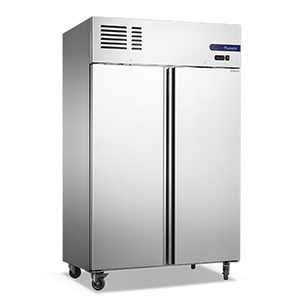
2 Doors Fancooling Upright Freezer
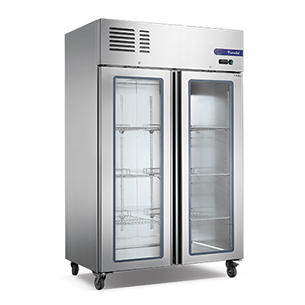
2 Glass Doors Fancooling Upright Freezer
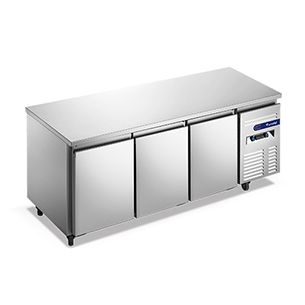
3 Doors Fancooling Undercounter Freezer
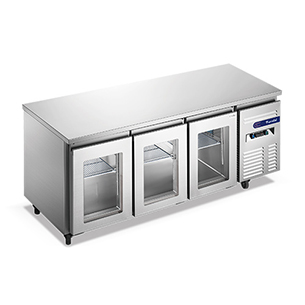
3 Glass Doors Fancooling Undercounter Freezer
What is a Commercial Chiller?
A commercial chiller operates within a controlled temperature range of 0°C to 5°C, designed to preserve perishables like dairy, fresh produce, and beverages without freezing them. These units are indispensable in settings requiring short-term storage with frequent access, such as salad bars, deli counters, or hospital kitchens.
Key to its functionality is a precision thermostat that maintains the "safety zone" for food hygiene, paired with a multi-directional airflow system to eliminate temperature hotspots, ensuring crisp lettuce stays crisp and cheeses retain their texture. For high-risk environments like healthcare facilities or hospital kitchens, antibacterial-coated evaporators and HACCP-compliant blast chillers rapidly cool cooked foods from 70°C to 3°C in under 90 minutes, mitigating bacterial growth.
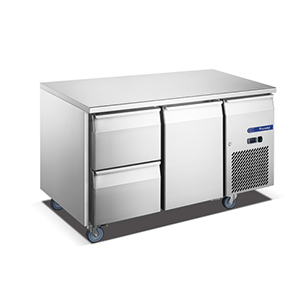
1 Doors 2 Drawers Fancooling Undercounter Chiller
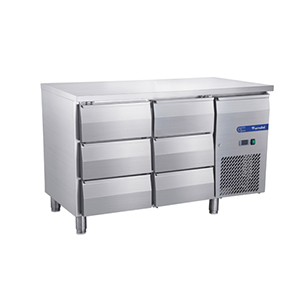
6 Drawers Fancooling Undercounter Chiller
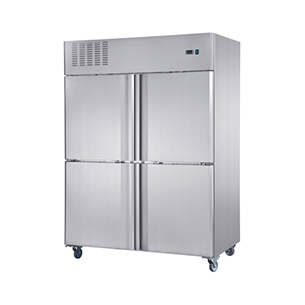
4 Doors Fancooling Upright Chiller
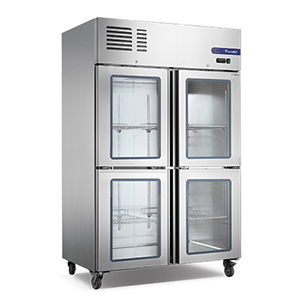
4 Glass Doors Fancooling Upright Chiller
Commercial Freezer vs Chiller: Key Differences
| Differences | Commercial Freezer | Commercial Chiller |
|---|---|---|
| Functional Purpose and Use Cases | Ideal for long-term storage of frozen goods like bulk meat, seafood, and ice cream. | Suitable for short-term preservation of fresh items like salads, cheeses, and dairy. Example: A hotel kitchen might use a freezer for frozen desserts and a chiller for daily meal prep ingredients. |
| Temperature Range | Operate at -18°C or below. | Maintain 0°C to 5°C. Blast chillers, a hybrid category, can switch between chilling and freezing modes for versatility. |
| Storage Capacity and Practicality | Often have thicker insulation and heavier-duty components to sustain ultra-low temperatures. | Prioritize accessibility and airflow for frequent use. |
| Energy Efficiency | Modern freezers with inverter technology adjust compressor speed based on demand, cutting energy use by up to 25%. | Operating at milder temperatures, generally consume less power but require consistent airflow management. |
- What is a Commercial Freezer Used For?A commercial freezer is used for long-term storage of frozen goods like bulk meat, seafood, and ice cream.
- What is a Commercial Chiller Used For?A commercial chiller is used for short-term preservation of fresh items like salads, cheeses, and dairy products.
- What is the purpose of a blast chiller?A blast chiller rapidly cools food to preserve freshness and extend shelf life, often used in professional kitchens.
- Where do you have local support?In UAE,Saudi Arabia,Thailand,Vietnam,Indonesia,Cambodia,Tanzania, Mauritius, Reunion,we can provide local support
- Are you manufacturer?Yes,we are half manufacturer half trading company. Manufacturing Furnotel brand equipment, trading for all kinds of kitchen equipment,especially turn-key solution.
- Do you have installation service?Yes, we have engineer team for installation instruction, but it will be extra charged.
- How does a commercial freezer work?A commercial freezer works by maintaining temperatures below freezing to halt bacterial growth and preserve food quality.
- What kind of kitchen project can you do?We can provide A to Z solution to various kitchen,more than 2800 cases, such as hotel project,restaurant,bakery shop, fast food shop, cateen, central kitchen,café. Pls leave message to ask for reference book.
- Where are your customers located?We've provided service to more than 120 countries,pls leave message to ask for customer map.
- How to maintain a commercial freezer?Regular cleaning, checking seals, and managing defrost cycles help maintain a commercial freezer's efficiency and longevity.
- What' s your solution for high-altitude refrigeration challenges?Altitude-adaptive compressors with triple-sealed insulation maintain ±0.8°C at 2,500m, preventing tank deformation.
- What is the lead time for a customized hotel solution?The lead time for a customized hotel solution can vary significantly depending on the complexity of the customization and the specific requirements of the project. In general, the lead time refers to the period between when a customization request is made and when the solution is fully implemented

Since SHINELONG was established in Guangzhou in 2008, we have made great strides in the fields of commercial kitchen planning and kitchen equipment manufacturing.
IF YOU HAVE ANY QUESTION,PLEASE CONTACT US.
WhatsApp: +8618902337180
WeChat: +8618924185248
Telephone: 20-34709971
Fax: +86 20 34709972
Email: info@chinashinelong.com
After-Sales Contact
Whatsapp :+8619195343796
Email: service@chinashinelong.com
Add: No. 1 Headquarters Center, Tian An Hi-tech Ecological Park, Panyu Avenue, Guangzhou, China.


















